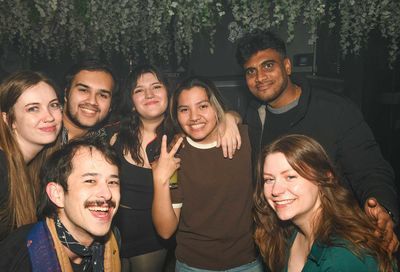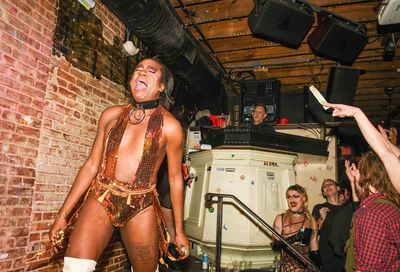‘The Comeuppance’ is a Masterful, Modern Danse Macabre
Playwright Branden Jacobs-Jenkins takes our souls for a spin in "The Comeuppance," the masterful season opener at Woolly Mammoth.

A fascinating contemplation, The Comeuppance takes another journey into playwright Branden Jacobs-Jenkins’ alternate universe in which the ordinary is sent spiraling into the extraordinary. With his usual mastery, Jacobs-Jenkins delivers with a precision instrument, weaving a subtle yet gripping tapestry of ideas, feelings and provocations.
As always, there is wit and warmth, even as he prods us into his favored territory: that which makes our moral compasses — and sometimes our souls — spin.
Like the preamble to a puzzle, The Comeuppance advances on us with a seemingly harmless premise: a “pre-game” gathering of former high school classmates hoping to reconnect over a few drinks before heading to a 20th reunion. The certainty that this is a construct — a space in which Jacobs-Jenkins will throw down his gauntlet — comes with a starkly-lit foreground set against a seemingly endless background of gauzy black layers.
The characters are in a sort-of limbo, not just between home and hotel ballroom, but between past and present. In this set-apart realm, he begins his churn.
From the get-go, a potentially malevolent presence stalks the gathering. Undetected by the guests, it ignites a slow-burning suspense that lives side-by-side — indeed within — something altogether more human: whether and how to broach the inconvenient truths of one’s past over party snacks and a high-octane punch.
As the evening unfolds, subterranean dynamics surface and dramas bubble while this entity comes and goes, observing and reflecting. The interplay is not only entertaining, it’s intellectually gripping. There is an exploration of mysteries here: a grappling with the urgency of life juxtaposed with the inevitable. It makes one want to see the play again, to examine it further and cogitate.
As the evening unfolds with the staggered arrivals of this once-tightknit group of high school misfits, it becomes clear from the tautly written exchanges, forced gaiety, and awkward silences that the reunion has an uncomfortable edge. Director Morgan Green confidently manages the pacing of these complex interactions but also knows how to let a moment breathe and this makes for an engaging momentum.
The first to arrive on host Ursula’s porch is Emilio, who has been living abroad for 15 years. He is unsettled, especially with the arrival of Katelyn, who seems to grate like a stone in his shoe. Matters intensify when Kristina arrives, bringing Francisco, an outsider.
Unable to attend, a final member, Simon checks in by speaker phone, largely oblivious to the party’s fractious dynamic. As the alcohol (and then pot) flows, the mix becomes volatile, the present electrified by the past, while an existential clock continues to silently tick.
Although almost an ensemble piece, the main touchstone here is Emilio, and Jordan Bellow is phenomenal, delivering a powerhouse performance and absolutely owning this troubled soul. Emilo may be provocative and even aggressive, but he is — in his way — seeking some truth and reconciliation. Bellow draws this beautifully, embodying this man’s complicated jumble of vulnerability, anger and reluctance fueling his need to agitate.
This feels with urgency like a living, breathing guy just trying to make sense of himself and his past, and he is painfully likable. Like all great actors, Bellow knows how to physically own a space, but he can also be stock still and deliver an entire inner landscape. And because he gets this role so right, he brings the oh-so-subtle pathos needed to feed the suspense that Jacobs-Jenkins aims to breed. Bellow is, without doubt, a talent to watch.
As Katelyn, Sarah Gliko manages another complex, but also a rather more recognizable, character: an insecure woman who has taken refuge in the shadow of men. Jacobs-Jenkins goes deeper, capturing a sense of a life unnurtured and Gliko, to her credit, embraces this vaguely unlikable Katelyn, bringing the kind of self-defeating defiance that comes with such territory.
Working less well is her connection — past and present — to Emilio, a problem that falls to director Green who, in a rare slip, doesn’t quite create the space for this to fully surface.
As Ursula, the host of the party, Alana Raquel Bowers is a quietly charismatic presence, keeping it understated and avoiding the stock type she might have been. She is ultimately an indispensable piece of the puzzle, but is a tad underwritten by Jacobs-Jenkins, so she feels a little less actualized.
Arriving like a ball of chaos, Taysha Marie Canales’ Kristina has a slightly unfocused start but gradually builds a convincing picture of a woman on the edge. Why she brings along Francisco is all a little vague, but he certainly turns up the heat and adds to the suspense. This is a challenging role both physically and because his is a character built largely of expository and Jaime Maseda handles it with skill. Together, the cast carry the evening with stunning fluidity.
If there are any moments that distract, they come from Jacobs-Jenkins’ occasional urge to over-egg the batter: Does Kristina really need to have that many kids? Did Katelyn have to be a straight-A student? Can’t Emilio just be as he seems? The final coda on COVID and our better selves may fit with the theme, but it also feels unnecessary.
But these minor thoughts aside, The Comeuppance is a masterful, modern danse macabre that will both wow you and — for better or worse — follow you home.
The Comeuppance (★★★★★) plays through Oct. 6 at Woolly Mammoth, 641 D St. NW. Tickets are $44 to $83. Call 202-393-3939 or visit www.woollymammoth.net.
Support Metro Weekly’s Journalism
These are challenging times for news organizations. And yet it’s crucial we stay active and provide vital resources and information to both our local readers and the world. So won’t you please take a moment and consider supporting Metro Weekly with a membership? For as little as $5 a month, you can help ensure Metro Weekly magazine and MetroWeekly.com remain free, viable resources as we provide the best, most diverse, culturally-resonant LGBTQ coverage in both the D.C. region and around the world. Memberships come with exclusive perks and discounts, your own personal digital delivery of each week’s magazine (and an archive), access to our Member's Lounge when it launches this fall, and exclusive members-only items like Metro Weekly Membership Mugs and Tote Bags! Check out all our membership levels here and please join us today!


























You must be logged in to post a comment.